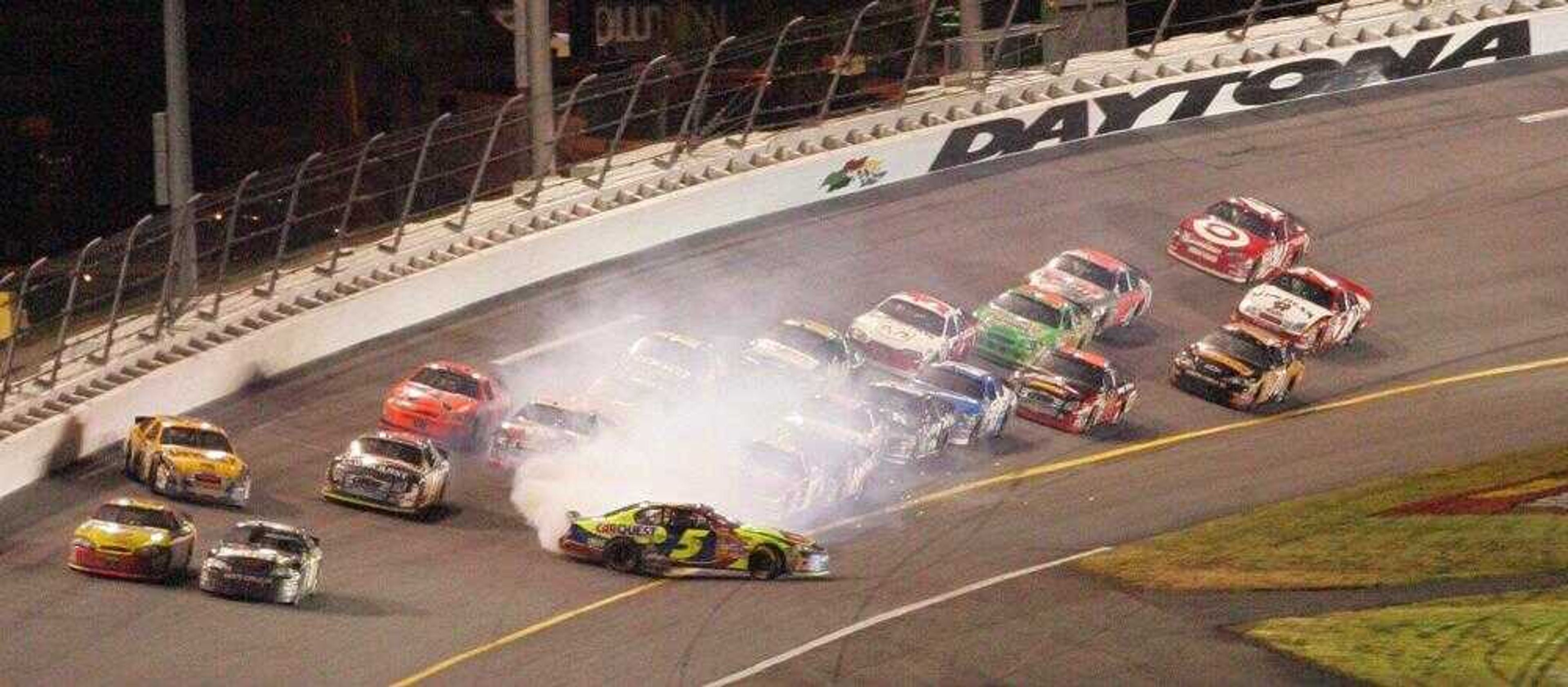Wild Daytona 500 finish bent both fenders, rules
By JENNA FRYER The Associated Press DAYTONA BEACH, Fla. -- It was a split-second decision that NASCAR could get neither right nor wrong. As the cars tumbled across the track in the Daytona 500's closing moments, series officials had to make a tough choice...
By JENNA FRYER
The Associated Press
DAYTONA BEACH, Fla. -- It was a split-second decision that NASCAR could get neither right nor wrong.
As the cars tumbled across the track in the Daytona 500's closing moments, series officials had to make a tough choice.
They could throw a caution flag immediately, giving Mark Martin a sentimental victory while denying Kevin Harvick a chance to race to the finish. Or they could let them race on -- even as a seven-car demolition derby exploded behind them -- in a frenzied final stretch that will be remembered as one of the best in NASCAR history.
NASCAR went for the drama.
When the cars crossed the finish line, the cheating scandal that ensnared five teams and tainted preparations for the Great American Race was forgotten -- at least for a while.
By allowing Harvick and Martin to race to the checkered flag, giving Harvick his first Daytona 500 victory and dropping Martin to 0-for-23, NASCAR created a whole new controversy.
"We get criticized for everything we do, and this is no exception," competition director Robin Pemberton said Monday. "If we throw the flag too early, people are mad that we kept Harvick from winning. If we throw it too late, people are mad that Mark Martin didn't win.
"It's hard. It's always hard. All we can do is make the best decisions that we can in that moment."
But in that moment NASCAR slightly changed its own rules.
In the old days, drivers raced to the flag when the caution came out. That practice was stopped in 2003, when NASCAR determined it was too dangerous to allow speeding cars to zip past an accident scene.
Now, the field is frozen and all cars must slow down when a caution comes out. Multi-car mayhem generally warrants a caution. But as Kyle Busch, Matt Kenseth and Jeff Gordon bumped and banged across the track just a few hundred yards from the finish, NASCAR let the racing go on.
It wasn't until Clint Bowyer flipped, crossing the finish line on his roof as flames ripped through his car, that NASCAR finally waved the yellow flag.
By then, it was too late for Martin. Harvick already had nosed ahead, beating him across the finish line by the length of his car hood. The .020 margin of victory was the closest in the history of electronic scoring at Daytona.
Martin initially was irate over his radio, criticizing NASCAR for not throwing the caution.
"I can't believe they waited!" he wailed.
Still, he refused to blast NASCAR for its decision -- which might have cost Martin his last shot at a Daytona 500 victory. He's easing into retirement and is racing a partial schedule this season, with no firm plans for his future.
"No one wants to hear a grown man cry," the 48-year-old Martin said. "I'm not going to cry about it. This is the end. They made the decision. That's what we're going to live with."
That's just how it goes in NASCAR, where the rules can be a moving target and enforcement is almost always arbitrary.
On any other lap at any other race, it's likely the caution would have come out the moment Busch and Kenseth made contact.
Arguing that it was OK because it was the last lap isn't right, either. In 2005, NASCAR froze the field on the final lap at Talladega Superspeedway because of a spinning car way behind the leaders. Tony Stewart crossed the finish line first, but Dale Jarrett got the win because he was ahead when the field was frozen.
Different circumstances lead to different interpretations.
It's why Johnny Benson wasn't flagged for driving below the yellow line in Friday night's Truck Series race, even though NASCAR has made that part of the track a strict no-no. But NASCAR deemed Benson's move legal.
It's why in a week that saw six people thrown out of the garage for cheating, Jeff Gordon received only a slap on the wrist when his car failed an inspection.
It's why Elliott Sadler and Scott Riggs were penalized for infractions that car owner Ray Evernham insisted are not even addressed in the rule book.
And it's why Michael Waltrip wasn't kicked out of the Daytona 500 after NASCAR found a fuel additive in his new Toyota Camry. The transgression was so blatant Pemberton said he was personally insulted. NASCAR cracked down on Waltrip with stiff penalties, but his presence in the race infuriated rival drivers.
The one constant of Speedweeks? Every incident proved it's past time for NASCAR to have a very clear rule book. Otherwise, everything will always be arbitrary -- even fantastic finishes like Sundays.
Jenna Fryer is the NASCAR writer for the Associated Press.
Connect with the Southeast Missourian Newsroom:
For corrections to this story or other insights for the editor, click here. To submit a letter to the editor, click here. To learn about the Southeast Missourian’s AI Policy, click here.








